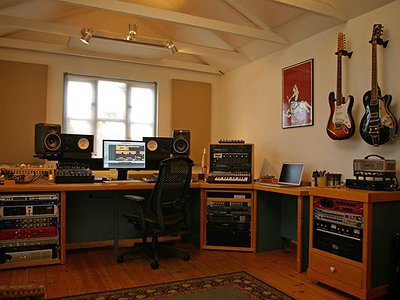What do you usually start with when working on a new piece?
With the artist’s demo. It’s a good way to figure out what’s working and what needs to be changed. Song structure is very important to me and I’ll often chop up the demo into a form that works for me, then mess around with groove ideas and other basic stuff. It’s very handy to have demo vocals to monitor while fleshing out the track, and sometimes elements of the home recording, including vocals, will go the distance. But usually it’s all just a jumping off point.
Certain sounds seem to be inextricably connected to particular genres or styles of music or even to different formats, like the CD or vinyl. Do you consider these as limitations, as a given or as a compositional tool which can be used in an inventive way?
It’s fun to bend the formula sometimes; to shake up a genre, but you still want to give the listener enough of what’s expected to feel grounded, and above all, hear and respond to the song without fighting through an overly clever arrangement. Saying ‘fuck you’ to convention can be satisfying and certainly has an audience. But pop music, which I guess is my specialty, carries certain traditions of structure and expectation which, handled properly, can be very satisfying as well. I don’t think physical formats, ‘delivery systems’, have any real impact on the average listener beyond convenience.
The line between production work and composition is blurring. In how much do you feel that these two areas could mutually influence and inspire each other?
This is a tricky area as remixing has become a fixture, with remixers often building an entirely new piece of music using only vocals from the original recording. Publishing splits start to figure in as well. I’ve had things remixed by a third party and loved the result, and more than once have used ideas and files from the remix to update my original recording. You can’t have too many good ideas, as long as you keep making the right decisions.
Budgets for productions are being reduced and more and more people are choosing to listen to music in compressed formats and on low-quality playback devices. In which way is this affecting music and how would you rate the state of production today?
Budgets are definitely down these days, and it’s become more of a buyer's market for the services of producers and engineers. There have always been great records made on a shoestring though. I believe that high quality artists and songs will surface regardless of the money being tighter. Some of the decisions made by record companies in this climate can do more harm than good unfortunately. A lot of great stuff gets shelved for the wrong reasons.
As for the quality of bit-rate compression and playback devices, I fell in love with pop music as a kid listening to the radio on a shitty transistor. I don’t think it’s as much of an issue as some people do.
The equipment-industry suggests that new equipment keeps making productions better. How much do you believe in the idea of progress in production? What are areas where you could imagine real improvements?
Well, having all the new options is fantastic. It wasn’t that long ago when I’d spend valuable studio time just getting two multi-track machines to run in sync. The bad old days. I do try though to emulate some of the older recording methods, like having to really learn a bass part for instance, then only giving myself three takes to nail it. It’s a good discipline, and keeps you focused while staring at 96 available tracks on the screen.
There are some impressive new plugins that do things like ride vocal levels, align backing vocals etc ... but that’s overkill to me. Hands-on is good, and more involving.
I wouldn’t mind seeing improvements in room correction, though KRK’s Ergo is pretty damn good. Home recording is huge now but the sonics of home mixing is lagging behind a bit.
It has often been suggested that "the future of music is in live”. How do you feel about the ongoing relevance of recordings as an art form? What can recordings provide that a concert can not?
Live performance, especially for more established artists, is an important way to make real money as record sales have dropped. Owning a recording is about living with the song, having it as part of your personal collection, and sharing it with others; buying into the artist, and looking forward to their next release. Fan culture is still important to everyone making music as a profession. Records get people to the shows, and shows get people buying records. That hasn’t changed much.
Usually, it is considered that it is the job of the producer and/or engineer to make a recording sound great. But listening is also an active, rather than just a passive process. How do you see the role of the listener in the musical communication process?
Even the ‘I only make music for myself’ type of artist knows that finding an audience for your work is essential if you want to keep going. The listener holds all the cards as far as I’m concerned. We’re all slaves to listener taste and subjectivity in this business, no matter how you try to bend things to your world view.
Please recommend two recording/mixing/mastering engineers to our readers which you feel deserve their attention.
I’ve always been a fan of Marcus Dravs as an engineer and co-producer. He’s a great guy as well. I’m really happy to see him break through in the past few years. Tchad Blake is one of the vibiest mixers around, and has been for ages. There are some really talented producers working right now…too many to list.
Mike Marsh, at the Exchange in London, is far and away my favourite mastering guy. He brings something to the process that’s beyond just being technically experienced. Mastering is still the dark arts to me, even though there are a lot of new ‘mastering’ plugins out now. There’s an old saying that also applies to mastering: ‘Don’t try this at home, kids!’
You can find Stephen Hague at www.bluepanda.com



